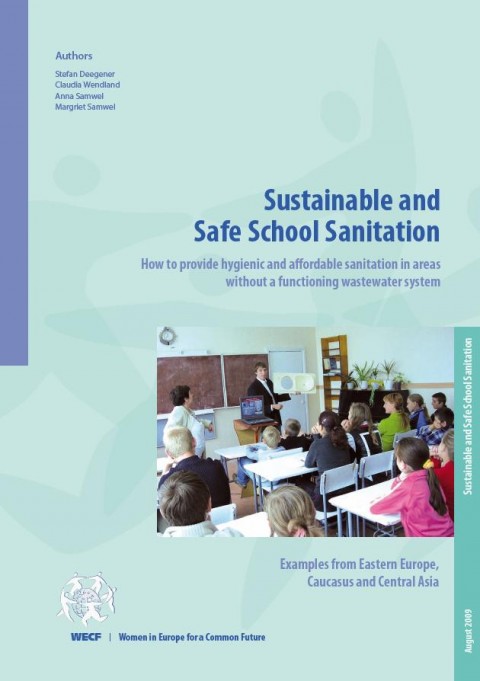Sustainable and safe school sanitation - How to provide hygienic and affordable sanitation in areas without a functioning wastewater system. Examples from Eastern Europe, Caucasus and Central Asia
Deegener, S. et al. (2009)

Published in: 2009
Publisher:
Women in Europe for a Common Future (WECF), The Netherlands, Germany, France
Author:
Deegener, S. et al.
Uploaded by:
SuSanA secretariat
Partner profile:
common upload
5780 Views
86 Downloads
Content - Summary
School sanitation is an important but often neglected issue for public health. Children are most vulnerable and affected by poor sanitation conditions. Related diseases, particularly diarrhoea and parasite infections hinder the children´s physical and intellectual development. In a number of countries, evaluations have shown that pupils are dropping out of school due to bad toilet conditions. This seems to be particularly the case for adolescent girls and leads to lower educational standards and attainment.
A wide variety of innovative school sanitation solutions exist, for example decentralised systems with low flush toilets connected to constructed wetlands, urine diverting dry toilets and simple grey water treatment, low flush toilets connected to biogas systems and many more. These decentralised sanitation solutions are appropriate depending on the different local conditions of available funds and materials, climate functioning water supply systems, local engineering skills etc. This publication will focus on one of the available solutions, that of urine diverting dry school toilet systems.
Compared to conventional toilets, UDDTs offer the possibility to explain the pupils in combination with the hygiene education the inter-linkages between ecology, agriculture, nutrient- and water-cycles.
Through its pilot demonstrations of school toilets, WECF has shown that the situation can be improved with fewer financial resources compared to the installation of flush-toilets. No infrastructure such as central water supply or sewerage system is needed for the operation of the UDDT.
Bibliographic information
Deegener, S. et al. (2009). Sustainable and safe school sanitation - How to provide hygienic and affordable sanitation in areas without a functioning wastewater system. Examples from Eastern Europe, Caucasus and Central Asia. Women in Europe for a Common Future (WECF), The Netherlands, Germany, France
Filter tags
English Europe & Central Asia Faeces or faecal sludge Practitioners Schools Sustainable WASH in institutions and gender equality (WG7) Urine Urine diversion dehydration toilets (UDDTs)















